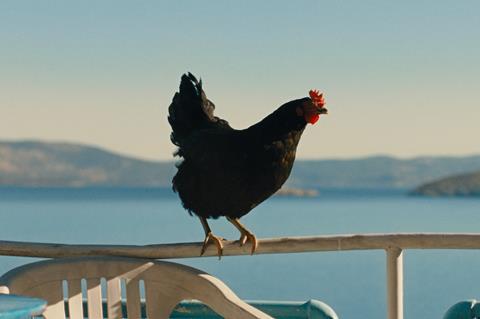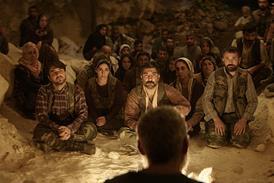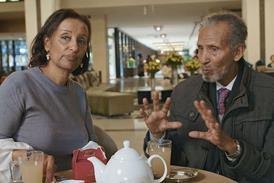Hungarian director György Pálfi’s emotive film takes the point of view of a hen escaping an industrial farm to reflect on humanity

Dir: György Pálfi. Germany/Greece/Hungary. 2025. 96mins
The triumph of Hungarian filmmaker György Pálfi’s drama Hen is not just that it manages to tell a compelling narrative entirely from the point of view of its titular fowl, but that it gives the bird such a depth of emotion and expression that audiences will truly believe they know what the animal is thinking. It’s an impressive piece of filmmaking, utilising all of its craft elements to bring a sense of humanity to this Greek-language story of a chicken who escapes an industrial farm in Greece and finds refuge in a crumbling rural restaurant, only to become an unwitting witness to real-world tragedies unfolding around her.
Draws parallels between mankind’s ill treatment of animals and each other
Like Jerzy Skolimowski’s EO and Andrea Arnold’s documentary Cow, Hen effectively uses its animal protagonist to shed light on wider human issues. Having premiered in Toronto’s Platform strand, where it achieved an honourable mention, it moved on to San Sebastian and Hamburg, and will also play in Tokyo competition. It could well pique the interest of arthouse distributors, and audiences should respond to its sensitive approach and endearingly plucky lead.
Or should that be leads, as Pálfi (Taxidermia, His Master’s Voice) worked with eight hens on the production, determined to avoid animatronics or CGI and instead shoot with real animals in a natural environment. Trained by Árpád Halász, each chicken was able to shoot for around 30 minutes at a time; a painstaking process which required Pálfi to understand and play to each animal’s strengths – some, he says, were flapping experts, others were particularly good at pecking. Seamless editing from Lehmhényi Réka also plays a crucial role.
This patience and care has paid off. The journey of this hen is compelling from the start, as we witness her birth (in an extreme close-up of her mother’s pulsating cloaca) in a huge poultry factory that seems to care nothing for animal welfare – some sequences are difficult to watch. The hen immediately stands out as a rare all-black bird and when, several months later, a sequence of events leads her to escape the factory, we are rooting for her to find proper sanctuary. After a short and eventful trip, in which she is pursued by a fox and finds herself in a dog’s jaws, she ends up in a run-down coastal restaurant.
Throughout, Pálfi keeps the focus squarely on the bird, Giorgos Karvelas’s camera scratching around at ground level, following her as she finds herself locked up in the restaurant’s coop. (A brilliant sequence in which our hen catches the eye of the scrawny cock, set to the strains of Greek love song Episimi Agapimeni by Grigoris Mpithikotsis is one of many inspired uses of music; another sees a laying montage set to the soaring strains of Ravel’s Bolero performed by The Swingle Singers). And because the camera is so intently trained on the hen, it takes a while for the world around her to come into focus: the arrival of desperate refugees, the human trafficking, the senseless violence.
With Hen, Pálfi is drawing obvious parallels between mankind’s ill treatment of animals and each other, critiquing a world in which living creatures are treated as nothing more than a commodity to be exploited. But he does so with a lightness of touch and an adroit dark comedy that avoids easy polemic. The hen is, of course, driven entirely by instinct – to feed, to protect her young, to survive – and has no understanding of events happening around her. Yet, as the cinematography, editing and music combine to imbue this hen with emotion and personality she becomes something of a silent Greek chorus, her absolute innocence throwing the horror of what’s happening in the background into sharp relief.
Production companies: View Master Films, Pallas Film, Twenty Twenty Vision
International sales: Lucky Number, ola@luckynumber.fr
Producers: Thanassis Karathanos, Costas Lambropoulos, Martin Hampel, Giorgos Kiriakos
Screenplay: György Pálfi, Ruttkay Zsófia
Cinematography: Giorgos Karvelas
Production Design: Konstantinos Zamanis
Editing: Lehmhényi Réka
Music: Szőke Szabolcs
Main cast: The Hens (Eszti, Szandi, Feri, Enci, Enikő, Nóra, Anett), Ioannis Kokiasmenos, Maria Diakopanagioti, Argyris Pantazaras, Eleni Apostolopoulou, Mahmod Bamerny, Antonis Tsiotsiopoulos, Antonis Kafetzopoulos
























